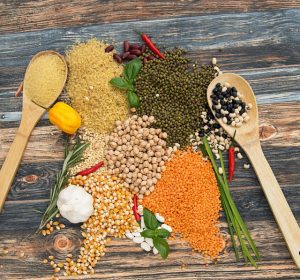 The variety and availability of plant-based protein has skyrocketed. As these foods become more mainstream and conflicting opinions surface, you may wonder if plant-based protein is a good fit for your eating pattern.
The variety and availability of plant-based protein has skyrocketed. As these foods become more mainstream and conflicting opinions surface, you may wonder if plant-based protein is a good fit for your eating pattern.
Popular Plant-Based Protein
Although veggie burgers have been around for decades (think BOCA burger), the Beyond Burger and Impossible Burger have recently garnered significant attention. Designed to sizzle when they hit a hot pan, these plant-based burgers are meant to provide an experience on par with a traditional burger. Plant-based protein products are perishable and should be kept frozen or refrigerated. Here are a few differences.
- Beyond Burger – The protein comes from peas, mung beans, fava beans, and brown rice. Beet juice gives the appearance of “bleeding.” Cook to 165°F.
- Impossible Burger – This burger uses soy and potato protein. Heme produced by genetic engineering provides the meaty taste and color. Cook to 160°F.
Pros and Cons of Plant-Based Proteins/Meats
Proponents argue that plant-based proteins/meats are better for you and the environment. Let’s look at some of the facts.
Environmental Footprint
The environmental footprint of plant-based proteins claims to be different than traditional beef. Production of the Beyond and Impossible Burgers requires less land and water and results in lower greenhouse gas emissions. The University of Michigan’s Center for Sustainable Systems compared the Beyond Burger in a 2017 life cycle assessment with a typical American beef patty and reports that it generated 90% less footprint than beef.
Nutrition
So, how does the nutrition of these plant-based proteins/meats compare to beef? See below for a comparison with 80/20 ground beef; all nutrition facts are for 4-ounce patties. Keep in mind that numbers change with leaner beef (i.e. 90/10 ground beef has less saturated fat) and may vary slightly between brands.
| Beyond Burger | Impossible Burger | 80/20 Ground Beef | |
| Calories | 250 | 240 | 290 |
| Total Fat | 18g | 14g | 23g |
| Saturated Fat | 6g | 8g | 9g |
| Cholesterol | 0mg | 0mg | 80mg |
| Sodium | 390mg | 370mg | 75mg |
| Total Carb | 3g | 9g | 0g |
| Dietary Fiber | 2g | 3g | 0g |
| Protein | 20g | 19g | 19g |
Key things to note
- Cholesterol – the plant-based patties have no cholesterol (because cholesterol is found in animal foods, not plant foods)
- Sodium – higher in the plant-based burgers
- Protein – about the same for all three options
- Saturated fat –similar because the coconut oil that makes the plant burgers sizzle is high in saturated fat
- Calories – 80/20 beef has more calories than the plant-based burgers. However, a 4-ounce patty of 90/10 beef only has about 200 calories, with 4 grams of saturated fat.
Despite their health halo, plant burgers are still processed foods (and may contain genetically modified food components, if that is a concern). Also, they can be expensive and not affordable for everyone. Still, although a plant- based patty may not be as healthful as some other food choices, it could be a good option for those who want to join a barbecue among family and friends but do not want to eat meat.
based patty may not be as healthful as some other food choices, it could be a good option for those who want to join a barbecue among family and friends but do not want to eat meat.
Meat and meat alternatives – whether plant-based or not – can be part of a healthful eating pattern. Ultimately though, a healthful eating pattern means enjoying a variety of whole foods, primarily of plant origin, like vegetables, fruits, and whole grains. At the end of the day, preparing black bean burgers and vegetables is more healthful, economical and sustainable – for both the environment and your wallet – than commercially prepared plant-based burgers.


Great information to consider. I prefer the veggie burgers I make with beans, grains and beets. I know what goes in them and I can customize them to my family’s tastes. It takes more effort to make them yourself, but the flavor and cost savings are significant advantages.